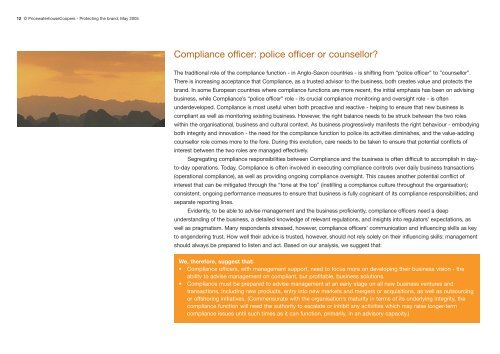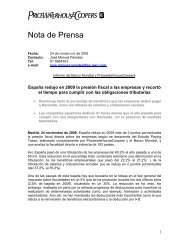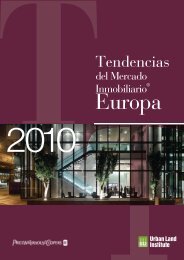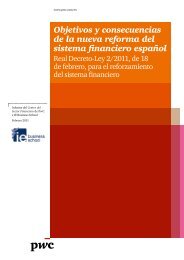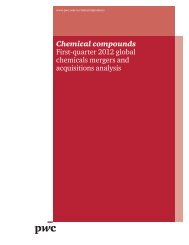Compliance Study_complet - pwc
Compliance Study_complet - pwc
Compliance Study_complet - pwc
You also want an ePaper? Increase the reach of your titles
YUMPU automatically turns print PDFs into web optimized ePapers that Google loves.
12 © PricewaterhouseCoopers - Protecting the brand, May 2005<br />
<strong>Compliance</strong> officer: police officer or counsellor?<br />
The traditional role of the compliance function - in Anglo-Saxon countries - is shifting from “police officer” to ”counsellor”.<br />
There is increasing acceptance that <strong>Compliance</strong>, as a trusted advisor to the business, both creates value and protects the<br />
brand. In some European countries where compliance functions are more recent, the initial emphasis has been on advising<br />
business, while <strong>Compliance</strong>’s “police officer” role - its crucial compliance monitoring and oversight role - is often<br />
underdeveloped. <strong>Compliance</strong> is most useful when both proactive and reactive - helping to ensure that new business is<br />
compliant as well as monitoring existing business. However, the right balance needs to be struck between the two roles<br />
within the organisational, business and cultural context. As business progressively manifests the right behaviour - embodying<br />
both integrity and innovation - the need for the compliance function to police its activities diminishes, and the value-adding<br />
counsellor role comes more to the fore. During this evolution, care needs to be taken to ensure that potential conflicts of<br />
interest between the two roles are managed effectively.<br />
Segregating compliance responsibilities between <strong>Compliance</strong> and the business is often difficult to accomplish in dayto-day<br />
operations. Today, <strong>Compliance</strong> is often involved in executing compliance controls over daily business transactions<br />
(operational compliance), as well as providing ongoing compliance oversight. This causes another potential conflict of<br />
interest that can be mitigated through the “tone at the top” (instilling a compliance culture throughout the organisation);<br />
consistent, ongoing performance measures to ensure that business is fully cognisant of its compliance responsibilities; and<br />
separate reporting lines.<br />
Evidently, to be able to advise management and the business proficiently, compliance officers need a deep<br />
understanding of the business, a detailed knowledge of relevant regulations, and insights into regulators’ expectations, as<br />
well as pragmatism. Many respondents stressed, however, compliance officers’ communication and influencing skills as key<br />
to engendering trust. How well their advice is trusted, however, should not rely solely on their influencing skills: management<br />
should always be prepared to listen and act. Based on our analysis, we suggest that:<br />
We, therefore, suggest that:<br />
• <strong>Compliance</strong> officers, with management support, need to focus more on developing their business vision - the<br />
ability to advise management on compliant, but profitable, business solutions.<br />
• <strong>Compliance</strong> must be prepared to advise management at an early stage on all new business ventures and<br />
transactions, including new products, entry into new markets and mergers or acquisitions, as well as outsourcing<br />
or offshoring initiatives. (Commensurate with the organisation’s maturity in terms of its underlying integrity, the<br />
compliance function will need the authority to escalate or inhibit any activities which may raise longer-term<br />
compliance issues until such times as it can function, primarily, in an advisory capacity.)


